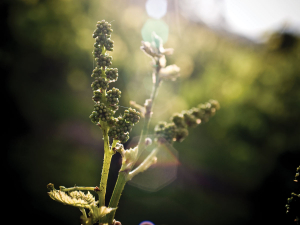Grape and wine science is only valuable if it's communicated to those in the field, says Bragato Research Institute Chief Executive Jeffrey Clarke.
"Our goal is to arm you with the knowledge, tools and confidence to innovate and try new ideas in your vineyards and wineries," he told attendees at the three Grape Days events around the country in June. "Our ability to empower you to make better decisions in your business is one of the ways that we define for ourselves our own goals as a research organisation."
And it's a two-way street, says Bragato Research Institute (BRI) Viticulture Extension and Research Manager Len Ibbotson. "There are no secrets. From the beginning of a project we want to share information and knowledge, not just from scientists out to industry, but working with growers to learn from them.”
Jeffrey’s talk on the research outlook for 2022 “and beyond” looked at projects being undertaken by BRI to tackle current and pressing issues, starting with the spur pruning trials that arose out of the Covid-19 lockdown and subsequent labour challenges.
Len says the trial is intended to give Marlborough Sauvignon Blanc growers insights into whether long spur pruning is a viable choice when it comes to yields and management of their vineyards. It involves replicated trial work on four sites around Marlborough, which are considered representative of the region, including sites where there are “reasonably high expectations in terms of yield”.
The BRI is also working with commercial growers who are already using spur pruning, to gain more knowledge and data. “We want to create a reservoir of information for industry relating to how they might implement long spur pruning,” he says, noting that grapes from the trial will be taken to the BRI research winery each year to compare the wines from long spur and cane pruning, “to make sure the quality is what we expect and what consumers expect”.
A climate change session during Grape Days discussed another example of reactive research filling an immediate need, with trials undertaken following hail and frost events in North Canterbury and Hawke’s Bay in 2019 and 2020. “Every situation is different,” Len told the audience, while outlining results on the efficacy and cost implications of hail and frost responses, including shoot removal.
Growers were warned to avoid a “prescriptive approach” to hail damage, instead taking into account timing, extent of the damage and potential costs and consequences of remedial action. The two-year project gathered information from affected growers, including yields of the vines after hail damage and the management response. The BRI also developed a hail damage assessment scorecard to help growers determine the extent of impact.
With a theme of Winegrowing in a Changing Environment, the 2022 Grape Days events - held in Hawke’s Bay, Marlborough and Central Otago - also included sessions on trunk disease, the Vineyard Ecosystems programme, weevils, agroecology, climate change, vineyard waste, and Pinot Noir – paradox, potential and provenance.
There were also regional panel discussions, with the Marlborough Grape Days audience hearing about recruiting and retaining labour, and tips for managing vineyards in a limited labour environment, while Hawke’s Bay spoke of downy mildew and cover cropping for improved profitability, and Central Otago panels discussed cover cropping initiatives.
Now in its 14th year, Grape Days are provided as part of the industry’s research programme, funded by the New Zealand Winegrowers’ levy and delivered through BRI. Jeffrey says the future has “never looked better” for grape and wine research. “Our vision is of Bragato Research Institute being part of an evolving sophisticated wine innovation system in New Zealand. We see our role as being an enabler dedicated to your success.”
BRI Research Winery - Vintage 2022
The Bragato Research Institute research winery processed 7.8 tonnes of fruit in vintage 2022, an increase of 45% from vintage 2021, and undertook 193 ferments. Trials were run on a wide-ranging number of winemaking techniques and ingredients, such as antioxidant products, novel yeasts, vegan fining agents, new enzymes, and alternative products to increase thiols. There were also a number of trials focused on the finished impact of vineyard practices, including effects of longspur pruning on Sauvignon Blanc wines, weed management practices, mealybug spraying, managing powdery mildew in the winery, and effects of trunk disease on Sauvignon Blanc wines.














